Choosing a Gaming CPU October 2013: i7-4960X, i5-4670K, Nehalem and Intel Update
by Ian Cutress on October 3, 2013 10:05 AM ESTMetro2033
Our first analysis is with the perennial reviewers’ favorite, Metro2033. It occurs in a lot of reviews for a couple of reasons – it has a very easy to use benchmark GUI that anyone can use, and it is often very GPU limited, at least in single GPU mode. Metro2033 is a strenuous DX11 benchmark that can challenge most systems that try to run it at any high-end settings. Developed by 4A Games and released in March 2010, we use the inbuilt DirectX 11 Frontline benchmark to test the hardware at 1440p with full graphical settings. Results are given as the average frame rate from a second batch of 4 runs, as Metro has a tendency to inflate the scores for the first batch by up to 5%.
One 7970
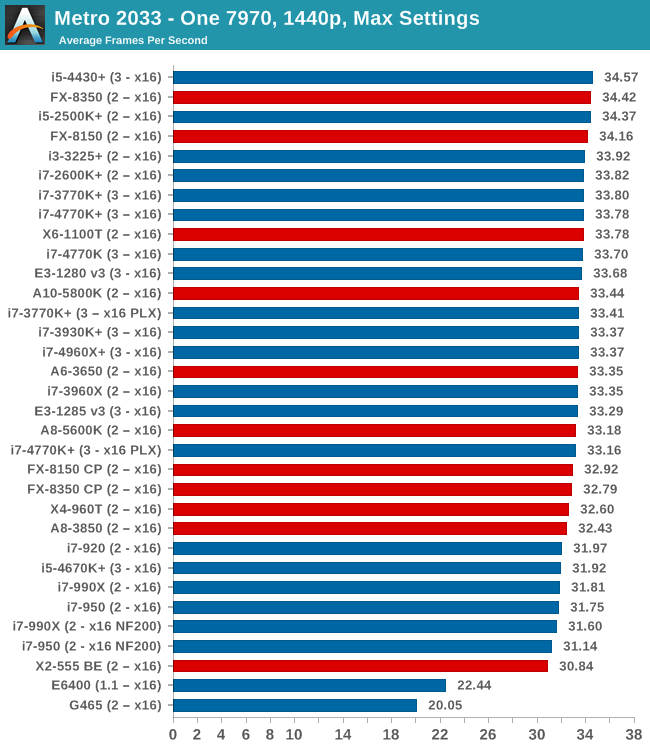
Almost all our test results fall between 31-35 FPS, which technically means a 10% difference between Nehalem CPUs and the latest Intel and AMD CPUs.
Two 7970s
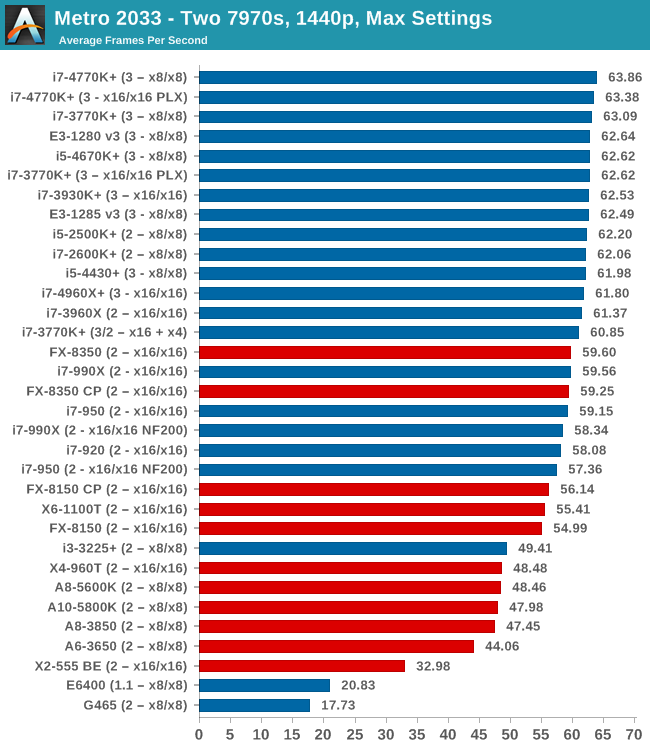
Doubling up to two 7970s and the Nehalems are in the ballpark of the Piledriver CPUs, but for comparison the quad core i5-4670K is similar to the full fat i7-4770K. Anything quad core and Intel, Sandy Bridge and above, hits 60 FPS average.
Three 7970s
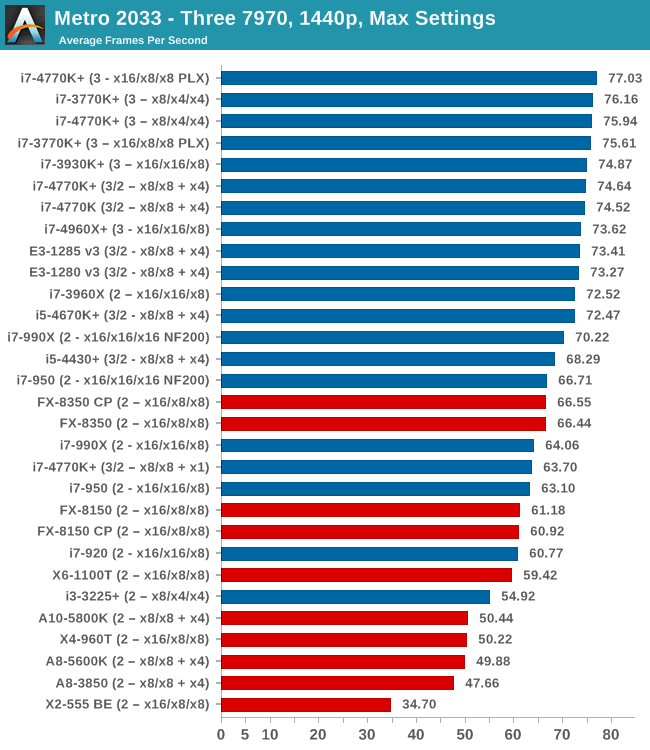
At three GPUs we have a bit more seperation going on, with the Nehalems losing out due to IPC - only on the NF200 enabled motherboard do we get 70 FPS. There are no benefits moving to the hex-core Ivy Bridge-E i7-4960X, but the jump from 4670K to 4770K nets five FPS.
One 580
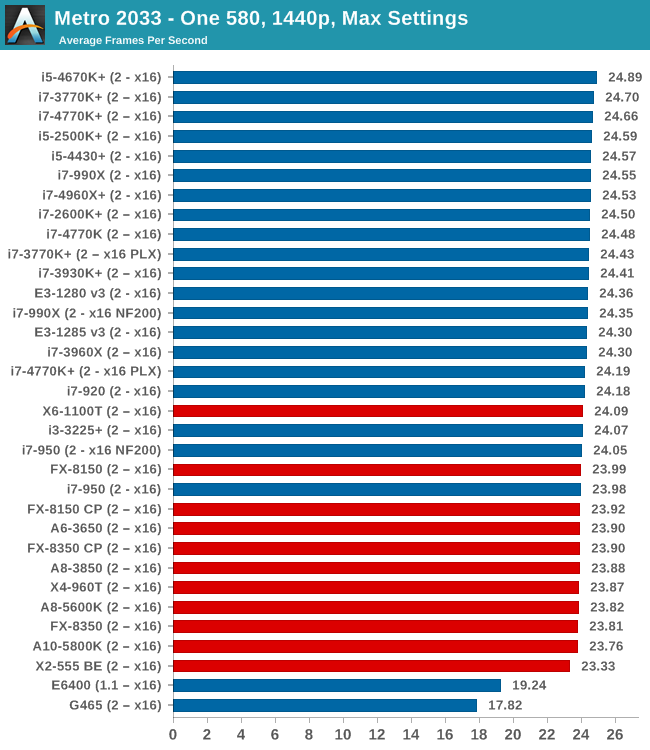
Similar to the 7970s, most modern CPUs perform the same. Beware of single core CPUs however, with the G465 not fairing well.
Two 580s
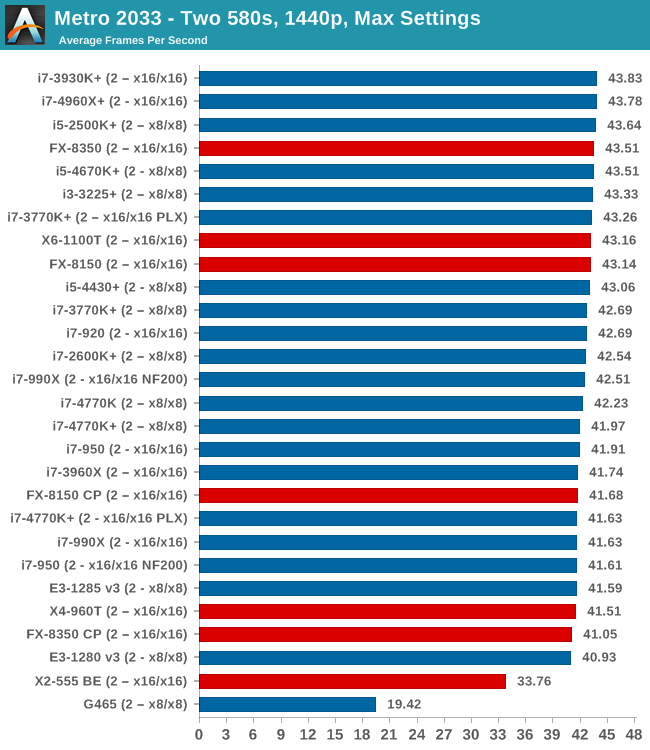
Similarly in dual NVIDIA GPU, there is not much difference - ~3 FPS at most unless you deal with dual core CPUs. Interestingly the results seem to be a little varied within that 41-44 FPS band.
Metro2033 Conclusion
In terms of single GPU, almost all the CPUs we have tested perform the same within a margin. On dual AMD GPUs we start to see a split, with the older Nehalem CPUs falling under 60 FPS. On tri-GPU setups the i5-4430 performs close to the Nehalems, and moving from 4670K to 4770K merits a jump from 72.47 FPS to 74-77, depending on lane allocation.










137 Comments
View All Comments
konondrum - Thursday, October 3, 2013 - link
Thank you for doing this, it's quite informative. I just have one suggestion, perhaps you could get a Lynnfield CPU into these benchmarks. I've been happily using my i5-750 for about 4 years now, but I'm unsure if the performance would be closer to a i7-920 or Q9400. I'm thinking it may be getting close to time to upgrade, but I've still never come across a game or app that seems to choke it.teiglin - Saturday, October 5, 2013 - link
+1 to Lynnfield. My i5-750 is still running great at a gentle ~3.5GHz, and I haven't really felt the burn in games, but I also am not running multi-GPU. Still I'd love to see how well it stacks up to the competition.cbrownx88 - Thursday, October 3, 2013 - link
BF3/4 pleeeease.BF4 beta seems very CPU-bound on an i7920 at 4.2ghz at 1920x1200... very different story than BF3 (where I currently didn't feel the need to update)
pandemonium - Friday, October 4, 2013 - link
I love articles like this! Excellent stuff, thanks!I'm still confused why you guys don't have an i5-3570k in your line-up. Of all of the processors, that's probably the most crucial to have, being it's performance for the price and popularity for builds. These tests give me little to go on without that processor, as important as it is for the general builder!
pandemonium - Friday, October 4, 2013 - link
Also, CPU benchmarks for gaming aren't as necessary with single player games. A necessary contrast for CPU comparison will be for MMOs or multiplayer FPS runs. Obviously it's more difficult to get accurate baseline results for such instances, but a large amount of runs should at least minimize any variables between each testing instance and give a broader definition for how well each processor will perform.If you guys could get on the latest MMOs and test out these rigs, that'd be where I see charts for CPU comparison really come into play for gaming.
Nirvanaosc - Friday, October 4, 2013 - link
Final Fantasy XIV has a benchmark, but I don't know if it fits on their needs. Maybe worth check it although I'm not sure if that represents real world gameplay.BOMBOVA - Friday, October 4, 2013 - link
Guys and Gals:, i have started using Video editing software, Coral, and Photo software ACD17, and need the best out of my i7 960, so, i have spent considerable time fitting with a new SYBA x4 SATA 3 controller, "50" bucks, and a better CPU cooler, double fan, big aluminum / copper beast. out come it works, SSD's are working like they should in Raid 0, / with 2.5 hdd backup, using hot swap. and i went back to the literature " stories " of over clocking, and settled on a 4.2 overclock. Letting you all know it words really, really good. i am almost ashamed of myself, " being techie " that it took me so long to get practical. . i am now resigned to waiting for DDR 4, and PCIe 3.x for future considerations. good article/ thanksBOMBOVA - Saturday, October 26, 2013 - link
update, i really parked the beast cpu 960 at 3.8x Mhz, 4.2 is too HOT, the fan rate is NOISy, and it is unstable, as i am wondering if my hard drive crashes are Malware, or just unstable, NONE of that at 3.8x, i will adjust my PCIe rate up from 133 MHz, say towards 137 or even 140 if stable, on all add in cards. it only works to your least stable card, i have settled on a Marvel, hdd controller card, for cheap , cost effective, bottom line, i like this article, and after 3 days of work, i am on to doing work with my computer. thanks all. Cheers Thomas Gx yvr.ca Vancouver CanadaRanger101 - Friday, October 4, 2013 - link
Every time an article of this sort is written, the conclusion is the same: In the vast majority of cases, due to GPU bottlenecks the differences between Cpus are so minute that no-one would ever notice the performance difference in game. Yawn.Ranger101 - Friday, October 4, 2013 - link
Every time an article of this sort is written, the conclusion is the same. In the vast majority of cases, due to GPU bottlenecks, the performance differences between CPUs are so minimal that no-one would notice the difference in game. Yawn.